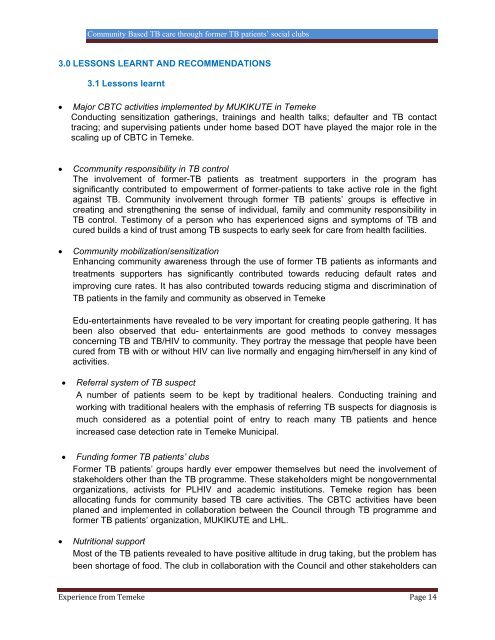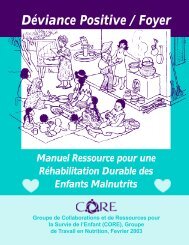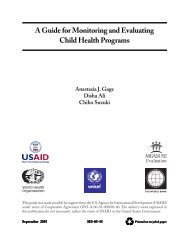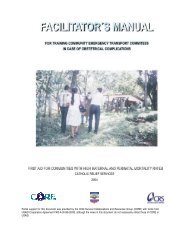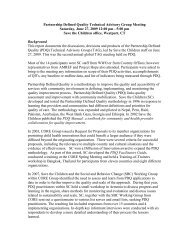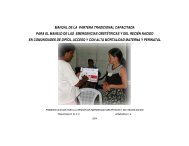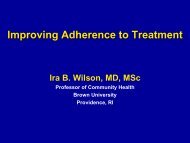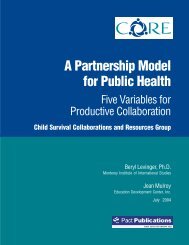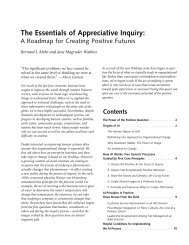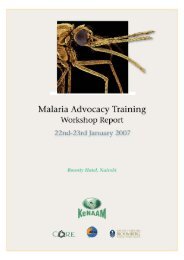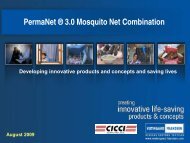Community-Based TB Care: Experience from ... - CORE Group
Community-Based TB Care: Experience from ... - CORE Group
Community-Based TB Care: Experience from ... - CORE Group
Create successful ePaper yourself
Turn your PDF publications into a flip-book with our unique Google optimized e-Paper software.
<strong>Community</strong> <strong>Based</strong> <strong>TB</strong> care through former <strong>TB</strong> patients’ social clubs3.0 LESSONS LEARNT AND RECOMMENDATIONS3.1 Lessons learnt• Major CBTC activities implemented by MUKIKUTE in TemekeConducting sensitization gatherings, trainings and health talks; defaulter and <strong>TB</strong> contacttracing; and supervising patients under home based DOT have played the major role in thescaling up of CBTC in Temeke.• Ccommunity responsibility in <strong>TB</strong> controlThe involvement of former-<strong>TB</strong> patients as treatment supporters in the program hassignificantly contributed to empowerment of former-patients to take active role in the fightagainst <strong>TB</strong>. <strong>Community</strong> involvement through former <strong>TB</strong> patients’ groups is effective increating and strengthening the sense of individual, family and community responsibility in<strong>TB</strong> control. Testimony of a person who has experienced signs and symptoms of <strong>TB</strong> andcured builds a kind of trust among <strong>TB</strong> suspects to early seek for care <strong>from</strong> health facilities.• <strong>Community</strong> mobilization/sensitizationEnhancing community awareness through the use of former <strong>TB</strong> patients as informants andtreatments supporters has significantly contributed towards reducing default rates andimproving cure rates. It has also contributed towards reducing stigma and discrimination of<strong>TB</strong> patients in the family and community as observed in TemekeEdu-entertainments have revealed to be very important for creating people gathering. It hasbeen also observed that edu- entertainments are good methods to convey messagesconcerning <strong>TB</strong> and <strong>TB</strong>/HIV to community. They portray the message that people have beencured <strong>from</strong> <strong>TB</strong> with or without HIV can live normally and engaging him/herself in any kind ofactivities.• Referral system of <strong>TB</strong> suspectA number of patients seem to be kept by traditional healers. Conducting training andworking with traditional healers with the emphasis of referring <strong>TB</strong> suspects for diagnosis ismuch considered as a potential point of entry to reach many <strong>TB</strong> patients and henceincreased case detection rate in Temeke Municipal.• Funding former <strong>TB</strong> patients’ clubsFormer <strong>TB</strong> patients’ groups hardly ever empower themselves but need the involvement ofstakeholders other than the <strong>TB</strong> programme. These stakeholders might be nongovernmentalorganizations, activists for PLHIV and academic institutions. Temeke region has beenallocating funds for community based <strong>TB</strong> care activities. The CBTC activities have beenplaned and implemented in collaboration between the Council through <strong>TB</strong> programme andformer <strong>TB</strong> patients’ organization, MUKIKUTE and LHL.• Nutritional supportMost of the <strong>TB</strong> patients revealed to have positive altitude in drug taking, but the problem hasbeen shortage of food. The club in collaboration with the Council and other stakeholders can<strong>Experience</strong> <strong>from</strong> Temeke Page 14


